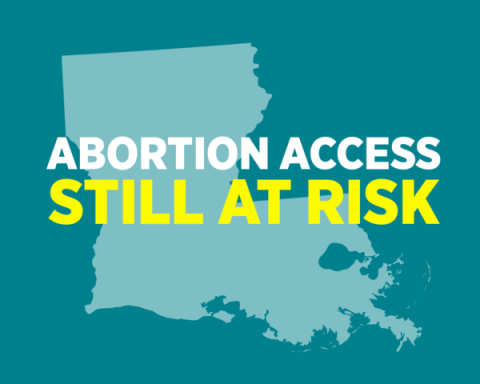Updated on November 5, 2020:
On November 3, Louisiana voters approved an amendment to the state’s constitution that explicitly states the constitution does not protect abortion rights. Amendment 1 paves the way for a state-level abortion ban if federal abortion rights are dismantled. Louisiana’s existing "trigger law" (an abortion ban that goes into effect if federal abortion rights are overturned) had the potential to be challenged under the state constitution and Amendment 1 takes away that possibility.
First published October 14, 2020:
Just months after the U.S. Supreme Court struck down a Louisiana law restricting abortion access, antiabortion politicians and activists in the state are making it clear that the ruling did not end their fight against abortion in Louisiana, or anywhere else. This November, Louisiana residents will vote on an amendment to the state constitution that would block use of the state constitution to protect abortion rights. This type of constitutional amendment—previously adopted in Alabama, Tennessee and West Virginia—sets up the state legislature to adopt further abortion restrictions and even ban abortion entirely, if federal constitutional protections were also to change under the rulings of an increasingly conservative Supreme Court.
Abortion patients in Louisiana already contend with a labyrinth of abortion restrictions; this ballot initiative, if passed, would provide the foundation for the state to erect even more legal and logistical barriers. The burden of future restrictions, like the ones already in place, would be carried by those already lacking sufficient resources and access to health care.
The Louisiana ballot initiative is part of a nationwide strategy by abortion opponents to undermine constitutional rights at both the federal and state levels. One part of that strategy is to overturn federal protections for abortion. When the Supreme Court struck down a Louisiana restriction in June 2020 that threated to close the state’s abortion clinics, Chief Justice John Roberts indicated in his opinion that he would welcome additional cases that seek to weaken abortion rights. Moreover, the Court is on the verge of having a solid majority who are likely to undermine or overturn federal abortion rights, with the nomination of Amy Coney Barrett following the death of Justice Ruth Bader Ginsburg.
The other part of the antiabortion strategy is to amend state constitutions to explicitly exclude any protection for abortion. Most legal challenges to state abortion restrictions have been filed in federal courts, but state constitutions can also provide protections. Nine states’ constitutions are currently interpreted to protect abortion rights. Tennessee and West Virginia also had protective constitutions until ballot initiatives were adopted there (Tennessee in 2014 and West Virginia in 2018). In 2000, the Tennessee Supreme Court affirmed the state constitutional right to abortion by striking down required abortion counseling, a two-day waiting period and unnecessary regulations on abortion clinics. In 1993, the West Virginia Supreme Court held that its state constitution protected abortion rights when it required the use of state Medicaid funds to cover abortion care.
Although the Louisiana constitution has not been interpreted as protecting abortion rights, it does not explicitly bar such protections; adopting this ballot initiative would make it impossible to challenge an abortion restriction or outright ban should federal protections be weakened or eliminated. The three states that have already passed antiabortion constitutional amendments like this provide examples of the types of harm that can follow:
- In the months after Alabama voters approved a constitutional amendment in 2018, the governor signed the most extreme antiabortion legislation passed in a state in decades—a total abortion ban. (That ban has been challenged in federal court and is not in effect.)
- Since the Tennessee constitution was amended in 2014, multiple restrictions have been put in place. Among the first restrictions adopted were laws similar to those that were struck down in 2000: mandatory abortion counseling, a 48-hour waiting period before an abortion procedure and burdensome clinic regulations. (The abortion clinic regulations were struck down in federal court, but not before one clinic closed.)
- Within hours of approving an amendment to the West Virginia constitution in 2018, the state adopted the same type of restriction that had been struck down by the state supreme court in 1993, limiting Medicaid coverage of abortion to cases of life endangerment, severe health conditions, fetal genetic anomaly, rape or incest.
It is not surprising that this ballot initiative is before Louisiana voters. Louisiana has enacted more abortion restrictions than any other state since abortion was legalized nationally in 1973, ranking it among the six states most hostile to abortion rights. Abortion care is very limited for the 926,000 women of reproductive age in Louisiana. Since 2011, the state has gone from having seven abortion clinics to three, with an average one-way driving distance of 41 miles for patients to reach a clinic. And there is a court case pending on the state’s refusal to issue a license to what would be the fourth clinic.
If approved by Louisiana voters, the state constitutional amendment would make it easier to adopt even more abortion restrictions in the event that federal abortion protections are weakened by the Supreme Court. Without either federal or state protections, there would be little to prevent the Louisiana legislature and governor from enacting an outright abortion ban.
State constitutions, like the U.S. Constitution, are often used to protect individuals from government interference and safeguard civil rights. This ballot initiative instead uses the Louisiana constitution as a means to undercut those rights by allowing for additional restrictions on abortion. Any more restrictions would create a disproportionately high barrier for those who already bear the burden of reduced access in the state, such as people of color, young people, LGBTQ individuals and those with low incomes. Affordable, available and accessible abortion care is critical to ensuring reproductive freedom, and efforts to reduce abortion access violate the dignity and bodily autonomy of all those who seek care.
